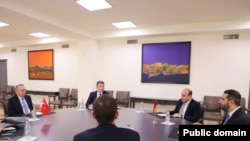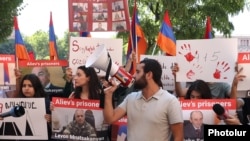Turkish envoy Serdar Kilic was greeted by his Armenian opposite number, deputy parliament speaker Ruben Rubinian, as he entered the country through a closed Turkish-Armenian border crossing. The two men held talks in Yerevan later in the day.
According to identical readouts of the meeting released by the Turkish and Armenian foreign ministries, Rubinian and Kilic “confirmed the issues they had worked and agreed on at previous meetings.”
“In this context, they exchanged views on the implementation of the agreement on border crossings reached at their meeting on July 1, 2022. The Special Representatives agreed to expedite this process,” the statement said without specifying any time frames.
The agreement cited by the statement calls for the opening of the Turkish-Armenian border for Armenian and Turkish diplomatic passport holders as well as citizens of third countries. The Turkish government has dragged its feet over its implementation.
Ankara has for decades made the normalization of relations with Yerevan conditional on a resolution of the Armenian-Azerbaijani conflict acceptable to Azerbaijan. Rubinian said earlier this week that Armenian-Azerbaijani agreements brokered by the United States last month will accelerate the Turkish-Armenian normalization process.
“The Special Representatives also decided that the relevant authorities of both countries conduct the necessary technical studies for the rehabilitation and operationalization of the Kars-Gyumri railway and electricity interconnector,” added the joint statement.
It said that the two sides will also encourage domestic airlines to launch next summer more flight services between Turkish and Armenian cities.
Armenian opposition groups have been very critical of the normalization talks, saying that Ankara has not dropped its preconditions for opening the border and establishing diplomatic relations with Yerevan.
“It is obvious that from the outset this process has been carried out in the context of Armenia fulfilling Turkish preconditions without leading to a real settlement,” the youth wing of the Armenian Revolutionary Federation (Dashnaktsutyun) said in a statement.
The statement came as young Dashnaktsutyun activists picketed the main government building in Yerevan in protest against Kilic’s visit. They held pictures of Armenians prisoners remaining in Azerbaijan and chanted “No to denial,” alluding to Pashinian’s controversial statements on the 1915 Armenian genocide in Ottoman Turkey.
Pashinian declared in January that Armenians should “understand what happened” in 1915 and what prompted the subsequent campaign for international recognition of the slaughter of some 1.5 million Armenians as genocide. Armenian historians, opposition figures and retired diplomats expressed outrage at the remarks, saying that Pashinian cast doubt on the fact of the genocide officially recognized by over three dozen countries, including the United Staes.
Pashinian met with Turkish President Recep Tayyip Erdogan in Istanbul in May. Erdogan afterwards praised Yerevan for adopting a “more flexible” position on a transit corridor for Azerbaijan sought by Baku and Ankara.






